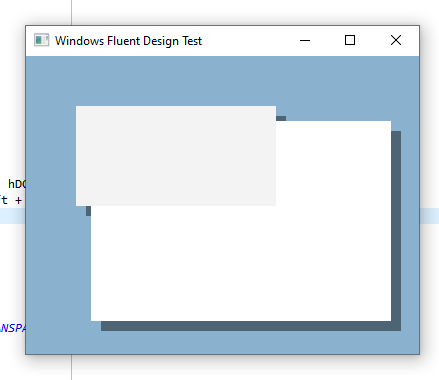Re: Windows 11 Fluent Design
James,
What panels do you mean ?
What panels do you mean ?
www.FiveTechSoft.com
https://fivetechsupport.com/forums/
https://fivetechsupport.com/forums/viewtopic.php?f=3&t=40625
What panels do you mean?
FWH provides oWindowOrAnyControl:Shadow()
/*
Purpose : Test Panel with shadows
Program : PanelShadow.prg
Author : James Bott, jbott@compuserve.com
Date : 07/09/2021 10:11:13 AM
Company : Intellitech
Copyright: Copyright © 2021 Intellitech. All rights reserved.
Language : Fivewin/xHarbour
Updated :
Notes : Attempting to figure out how to give a "panel" shadows
on all 4 sides like the new Windows 11.
*/
#include "fivewin.ch"
//#include "window.ch" // can't find this file anywhere
#define CS_DROPSHADOW 0x00020000
#define GCL_STYLE (-26)
Function Main()
Local oWnd, oPanel1, oPanel2 //, nColor:= RGB(123,123,123)
Set default to ".\"
define window oWnd title "Windows Fluent Design Test" ;
from 50,50 to 71, 101
//oWnd:shadow(,,,CS_DROPSHADOW) // makes strange show with outine on the outer edge on bottom and right side
//oWnd:setColor(rgb(23,23,23),Rgb(138,177,206)) // darker
//oWnd:setColor(rgb(23,23,23),Rgb(212,229,239))
oWnd:setColor(rgb(23,23,23), rgb(138,178,207))
@ 65,65 panel oPanel2 size 300,200 of oWnd //TRANSPARENT
oPanel2:setColor(rgb(0,0,0),Rgb(255,255,255))
//oPanel:= TPanel:New(50,50,300,550,oWnd)
//define panel oPanel from 50,50 to 300,500 of oWnd
@ 50,50 panel oPanel1 size 200,100 of oWnd //SHADOWSIZE 10 //TRANSPARENT BORDER BASE //SHADOWSIZE 10
oPanel1:setColor(rgb(0,0,0),Rgb(243,243,243))
//oPanel1:shadow() // doesn't do anything
//oPanel1:box(1,1,201,101,rgb(225,255,255)) // no effect
//oPanel1:cTitle("App Title") // doesn't work
oPanel1:say(1,1,"App title")
// Method Shadow() inherited from TWindow
// However it does nothing on oPanel. I found that this works only on upper level windows
//oPanel1:shadow(oPanel1:hWnd, GCL_STYLE, nOr( GetClassLong( oPanel1:hWnd, GCL_STYLE ), CS_DROPSHADOW) )
//oPanel2:shadow()
// msgInfo(valtype(oPanel1),"valtype(oPanel1")
// This errors with "message not found GetClassLong"
//oPanel1:SetClassLong( oWnd:hWnd, GCL_STYLE, nOr( GetClassLong( oWnd:hWnd, GCL_STYLE ), CS_DROPSHADOW ) )
activate Window oWnd center // on init
oWnd:end()
//-----------------------------------------------------------------------//
/*
Define window oWnd title "Mountian Lumber"
oWnd:setColor(rgb(23,23,23),Rgb(212,229,239))
activate window oWnd centered on init doDialogs(oWnd)
*/
Return nil
function doDialogs(oWnd)
local oDlg1,oDlg2
msgInfo("27 Invoices","Number of Outstanding Invoices")
//function Dialog1(oWnd)
DEFINE DIALOG oDlg1 FROM 5, 5 TO 15, 40 TITLE "Dialog Box" of oWnd
// oDlg:shadow() // has 4 sided shadow without this
activate dialog oDlg
//return nil
/*
//function Dialog2(oWnd)
DEFINE DIALOG oDlg2 FROM 5, 5 TO 15, 40 TITLE "Dialog Box" of oWnd
// oDlg:shadow() // has 4 sided shadow without this
activate dialog oDlg
//return nil
*/
Return oDlg oPanel1:bPainted = { | hDC | hDC := oWnd:GetDC(), FW_DrawShadow( hDC, { oPanel1:nTop, oPanel1:nLeft,;
oPanel1:nTop + oPanel1:nHeight(), oPanel1:nLeft + oPanel1:nWidth() }, 10 ),;
oWnd:ReleaseDC() }function FW_DrawShadow( hDC, aRect, nSize, nAlpha )
local hRgn1, hRgn2
DEFAULT nSize := 10, nAlpha := 0x70
hRgn1 := CreateRectRgn( aRect[ 2 ], aRect[ 1 ], aRect[ 3 ] + nSize, aRect[ 4 ] + nSize )
hRgn2 := CreateRectRgn( aRect[ 2 ], aRect[ 1 ], aRect[ 3 ], aRect[ 4 ] )
CombineRgn( hRgn1, hRgn1, hRgn2, 4 )
DeleteObject( hRgn2 )
SelectClipRgn( hDC, hRgn1 )
FillRectEx( hDC, { aRect[ 1 ] + nSize, aRect[ 2 ] + nSize, aRect[ 3 ] + nSize, aRect[ 4 ] + nSize }, ;
nAlpha * 0x1000000 )
SelectClipRgn( hDC )
DeleteObject( hRgn1 )
return nil screen capture open source
screen capture open source oPanel1:bPainted = { | hDC | hDC := oWnd:GetDC(),;
GradientFill( hDC, oPanel1:nTop, oPanel1:nLeft - 12,;
oPanel1:nTop + oPanel1:nHeight() + 12, oPanel1:nLeft,;
{ { 1, RGB( 254, 254, 254 ), RGB( 205, 205, 205 ) }, .F. } ),;
GradientFill( hDC, oPanel1:nTop, oPanel1:nRight,;
oPanel1:nTop + oPanel1:nHeight() + 12, oPanel1:nRight + 12,;
{ { 1, RGB( 205, 205, 205), RGB( 254, 254, 254 ) }, .F. } ),;
GradientFill( hDC, oPanel1:nTop + oPanel1:nHeight(), oPanel1:nLeft,;
oPanel1:nTop + oPanel1:nHeight() + 11, oPanel1:nRight,;
{ { 1, RGB( 205, 205, 205), RGB( 254, 254, 254 ) }, .T. } ),;
oWnd:ReleaseDC() }